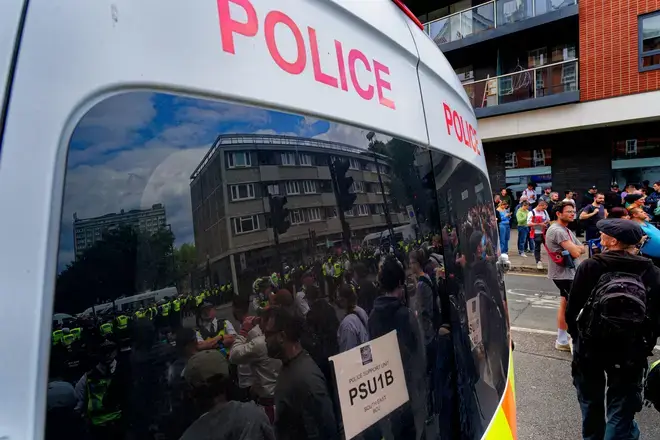The Metropolitan Police has said it will deploy officers from other regions to be "ready to respond" to numerous protests set to take place across the capital.
A senior officer admitted the scale of the demonstrations – including one protest of more than 500 people supporting the banned Palestine Action on Saturday – would put pressure on the force, but that it would be equipped “to respond to any eventuality”.
It comes after the force announced the first three people had been charged with supporting the group, now designated a terror organisation, in England and Wales on Thursday.
Other major events including the Community Shield match between Liverpool and Crystal Palace at Wembley are taking place and will require sizeable police resources.
Two marches organised by the Palestine Coalition and pro-Israeli group Stop the Hate respectively will also be held on consecutive days in central London.
A number of local protests in Tower Hamlets, Putney and Westminster opposing the continued Israeli military action in Gaza will be policed on Friday evening, while officers will also be deployed in the vicinity of hotels housing asylum seekers in Islington and in Canary Wharf.
Demonstrators let off flares and tried to “breach the fencing and access” the Britannia International Hotel in Canary Wharf at a previous protest on Sunday, while nine arrests were made outside the Thistle City Barbican Hotel in Islington two days earlier.
On Saturday, more than 500 people are expected to hold up placards supporting the banned Palestine Action in Parliament Square, after organisers Defend Our Juries announced earlier this week the event would go ahead.
Jeremy Shippam, 71, Judit Murray, also 71, and Fiona Maclean, 53, have all been charged with displaying an article in a public place, arousing reasonable suspicion that they are a supporter of a proscribed organisation after their attendance at a previous demonstration last month.
More than 200 people were arrested at a wave of Defend Our Juries protests across the UK in response to the ban implemented by Home Secretary Yvette Cooper last month.
Deputy Assistant Commissioner Ade Adelekan said: "The Met is very experienced at dealing with large scale protests, including where the protest activity crosses into criminality requiring arrests.
"While we will not go into the specific details of our plan, the public can be assured that we will have the resources and processes in place to respond to any eventuality.
"Anyone showing support for Palestine Action can expect to be arrested. I would once again urge people to consider the seriousness of that outcome.
"An arrest under the Terrorism Act can have very real long-term implications – from travel, to employment, to finances. Also, as we have seen this week, it is very likely an arrest in these circumstances will lead to a charge."
A further pro-Palestinian demonstration on Saturday, organised by the Palestine Coalition, will march from Russell Square to Whitehall followed by an assembly with speeches.
Public order conditions have been imposed on the march which mean it must not form or begin before 12pm, protesters must not deviate from or stop to form assemblies along the agreed route and the protest must end by 5.30pm, the Met said.
The force added it was not aware of an organised counter protest at the event.The National March for the Hostages will then have “a policing and security operation” in place when it begins in central London from 3pm on Sunday.
Stop the Hate, who are organising the march, have previously held a number of smaller counter protests in recent months.
Officers will also again be deployed to the Britannia International Hotel in Canary Wharf in anticipation of any further protest.
More public order conditions are likely to be imposed on some of the various other protests in the coming days, the force said.

